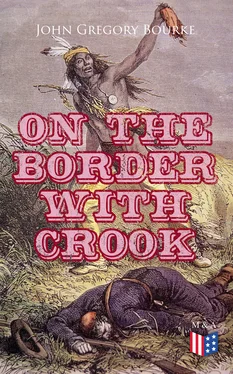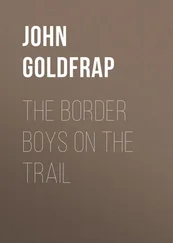There was plenty of “jerked” beef, savory and palatable enough in stews and hashes; eggs, and the sweet, toothsome black “frijoles” of Mexico; tomatoes equal to those of any part of our country, and lettuce always crisp, dainty, and delicious. For fresh fruit, our main reliance was upon the “burro” trains coming up from the charming oasis of Hermosillo, the capital of Sonora—a veritable garden of the Hesperides, in which Nature was most lavish with her gifts of honey-juiced oranges, sweet limes, lemons, edible quinces, and luscious apricots; but the apple, the plum, and the cherry were unknown to us, and the strawberry only occasionally seen.
Very frequently the presence of Apaches along the road would cause a panic in trains coming up from the south, and then there would be a fruit famine, during which our sole reliance would be upon the mainstay of boarding-house prosperity—stewed peaches and prunes. There were two other articles of food which could be relied upon with reasonable certainty—the red beet, which in the “alkali” lands attains a great size, and the black fig of Mexico, which, packed in ceroons of cow’s hide, often was carried about for sale.
Chile colorado entered into the composition of every dish, and great, velvety-skinned, delicately flavored onions as large as dinner plates ended the list—that is to say, the regular list. On some special occasion there would be honey brought in from the Tia Juana Ranch in Lower California, three or four hundred miles westward, and dried shrimps from the harbor of Guaymas. In the harbor of Guaymas there are oysters, too, and they are not bad, although small and a trifle coppery to the taste of those who try them for the first time. Why we never had any of them was, I suppose, on account of the difficulty of getting them through in good condition without ice, so we had to be content with the canned article, which was never any too good. From the Rio Grande in the neighborhood of El Paso there came the “pasas,” or half-dried grape, in whose praise too much could not be said.
The tables were of pine, of the simplest possible construction. All were bad enough, but some were a trifle more rickety than others. The one which wobbled the least was placed close to the north side of the banqueting-hall, where the windows gave the best “view.”
Around this Belshazzarian board assembled people of such consideration as Governor Safford, Lieutenant-Governor Bashford, Chief-Justice John Titus, Attorney-General MacCaffrey, the genial Joe Wasson, Tom Ewing, and several others. I was on a number of occasions honored with a seat among them, and enjoyed at one and the same moment their conversation and the “view” of which I have spoken.
There was a foreground of old tin tomato cans, and a middle distance of chicken feathers and chile peppers, with a couple of “burros” in the dim perspective, and the requisite flitting of lights and shadows in the foliage of one stunted mesquite-bush, which sheltered from the vertical rays of the sun the crouching form of old Juanita, who was energetically pounding between smooth stones the week’s washing of the household, and supplying in the gaudy stripes of her bright “serape” the amount of color which old-school critics used to maintain was indispensable to every landscape.
Juanita was old and discreet, but her thoughts were not altogether on the world to come. Her face was ordinarily plastered with flour-paste, the cosmetic of the Southwest. Why this attention to her toilet, the wisest failed to tell. Often did I assure her that nothing could improve her complexion—a statement not to be controverted—and never did she fail to rebuke me with her most bewitching smile, and the words, “Ah! Don Juan, you’re such a flatterer.”
The gentlemen whose names I have just given are nearly all dead or so well advanced in years and dignity that what I have to say now will not sound like flattery. They had each and all travelled over a great deal of the earth’s surface, and several of them were scholars of ripe learning. I was much younger then than I am now, and of course the attainments of men so much older than myself made a deep impression upon me, but even to this day I would place the names of Titus and Bashford in the list of scholars of erudition whom I have known, and very high up in the list, too.
The remainder of the patrons seemed to be about evenly divided between the cynical grumblers who, having paid their score with regularity, arrogated to themselves the right to asperse the viands; and the eulogists who, owing to temporary financial embarrassments, were unable to produce receipts, and sought to appease their not by any means too hard-hearted landlady by the most fulsome adulation of the table and its belongings.
Like the brokers of Wall Street who are bulls to-day and bears to-morrow, it not infrequently happened among the “Shoo Fly’s” patrons that the most obdurate growler of last week changed front and assumed position as the Advocatus Diaboli of this.
But, take them for all in all, they were a good-hearted, whole-souled lot of men, who had roughed it and smoothed it in all parts of the world, who had basked in the smiles of Fortune and had not winced at her frown; a trifle too quick on the trigger, perhaps, some of them, to be perfectly well qualified to act as Sunday-school superintendents, yet generous to the comrade in distress and polite to all who came near them. The Western man—the Pacific Sloper especially—is much more urbane and courteous under such circumstances than his neighbor who has grown up on the banks of the Delaware or Hudson. There was bitter rivalry between Mrs. Wallen and Mr. Neugass, the proprietor of the “Palace”—a rivalry which diffused itself among their respective adherents.
I make the statement simply to preserve the record of the times, that the patrons of the “Shoo Fly” never let go an opportunity to insinuate that the people to be met at the “Palace” were, to a large extent, composed of the “nouveaux riches.” There was not the slightest foundation for this, as I can testify, because I afterward sat at Neugass’s tables, when Mrs. Wallen had retired from business and gone into California, and can recall no difference at all in the character of the guests.
Tucson enjoyed the singular felicity of not possessing anything in the shape of a hotel. Travellers coming to town, and not provided with letters which would secure them the hospitality of private houses, craved the privilege of “making down” their blankets in the most convenient corral, and slept till early morn, undisturbed save by the barking of dogs, which never ceased all through the night, or the crowing of loud-voiced chanticleers, which began ere yet the dawn had signalled with its first rosy flush from the peak of the Santa Rita. It was the customary thing for wagon trains to halt and go into camp in the middle of the plaza in front of the cathedral church of San Antonio, and after the oxen or mules had been tied to the wheels, the drivers would calmly proceed to stretch out tired limbs in the beautiful moonlight.
I never could see the advantage of such a state of affairs, and felt that it belittled the importance of the town, which really did a very large business with the surrounding country for hundreds of miles. There are always two and even three different ways of looking at the same proposition, and to Bob Crandall and Vet Mowry this manner of camping “à la belle étoile” was the one thing “to which they pointed with pride.” It was proof of the glorious climate enjoyed by Tucson. Where else in the whole world, sir, could a man camp out night after night all the year round? Was it in Senegambia? No, sir. In Nova Zembla? No, sir. In Hong Kong? No, sir. In Ireland?—but by this time one could cut off the button, if necessary, and break away.
Читать дальше












